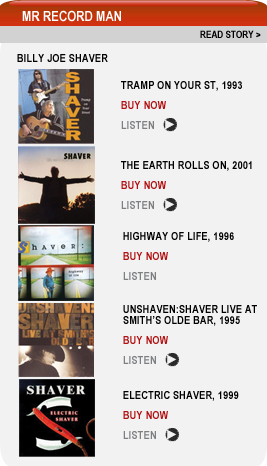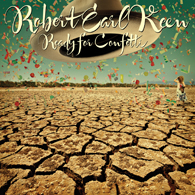
ROBERT EARL KEEN
Ready for Confetti
Buy Now |
Sitting down to review Robert Earl Keen’s latest, I asked a colleague via instant message if he’d received or had a chance to listen to his own advance copy of the album. “Not yet,” he replied, “but I hear it’s all Caribbean-ed out.” Ouch. For Keen’s sake, let’s nip that one right in the bud: Contrary to whatever misinformation might be floating around out there, Ready for Confetti is decidedly not Keen’s Caribbean folly — even though the breezy, featherweight title track could, I suppose, conceivably give off that impression. A hey-what-the-hell-let’s-join-’em celebration of life’s most carefree, presumably crazy spirits, “Ready for Confetti” is possibly Keen’s most out-there song to date, surpassing even the psychedelic title track to 2003’s Farm Fresh Onions.
“Ready for Confetti” — the song — will probably prove a tough jellybean some Keen fans to swallow (and you can pretty much count on them to bitch endlessly via anonymous Web posts). But just like any of the song’s colorful misfits, all dancing to the beat of their own drums in this “wigged-out, weird-out, wild and wacky world,” Keen has never been the kind of artist to adhere to anyone’s expectations in regards to his music but his own — whether it’s playing whatever he dang well pleases rather than answering every drunken request for one of his rowdier hits, or even, say, sticking a head-scratcher like “10,000 Chinese Walk Into a Bar” in the middle of his last album, 2009’s The Rose Hotel. His more idiosyncratic choices may not always make sense, and not everything he throws at the wall sticks, but anyone really caught off guard by his musical curveballs just hasn’t been paying close enough attention.
Ready for Confetti may have its share of such eccentricities, but like all of his best records, it rewards those who come to a Keen party ready for anything. Because along with the title track, the equally bonkers “Who Do Man” and the playful Hollywood celebrity send-up “Top Down” (which cruises along with the chilled-out vibe of an Hawaiian luau), it also features such primo additions to Keen’s songbook as the surrealistic spaghetti-Western opener, “Black Baldy Stallion,” the snappy, restless “I Gotta Go,” the reflective “Lay Down My Brother” and “Waves on the Ocean” and the golden-hearted “Show the World.” And if it’s bite you’re looking for, check out “The Road Goes On and On,” which is both a sly, self-aware nod to the albatross of his own biggest hit (you know the one) and a gloves-off smack down to a flashy would-be challenger who’s apparently lost the plot. He doesn’t outright name names, but have fun guessing: “How in the hell do you think you’ll make it/when the real test comes and you just can’t fake it?/Your sycophants say they can’t take it/and leave you on your own.” Ouch.
Actually, that bitter pill may be even tougher for some listeners to choke down than the confetti. But Keen balances it all out on the backend with two of his finest recordings yet: a sterling new version of his own “Paint the Town Beige” (first heard on his classic 1996 set, A Bigger Piece of Sky), and a terrific pass at Todd Snider’s “Train Song” that’s every bit as good as his outstanding cover of Townes Van Zandt’s “Flying Shoes” on his last album. Cap it all with a sincerely moving take on the traditional gospel tune “Soul of a Man,” long a staple of his live shows but never captured in the studio, and Ready for Confetti proves, not for the first time, that Keen’s instincts hit the mark a lot more often than not.
— RICHARD SKANSE
|
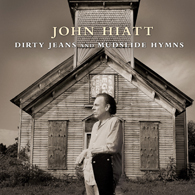
JOHN HIATT
Dirty Jeans and Mudslide Hymns
Buy Now |
The press blurb for John Hiatt’s current tour with Lyle Lovett refers to Hiatt as an 11-time Grammy nominee. There’s something gravely wrong with that sentence, though. It should read, “11-time Grammy winner.” The fact that Hiatt has never received his industry’s highest accolade is a travesty; you’d think by his 20th solo album, they’d have remedied that oversight. It’s not that others do his songs better than he does (though plenty have had bigger hits with them). It’s more likely the Dylan/Earle/Springsteen thing; land in a category with one of those cats, and your odds nosedive.
But Dirty Jeans and Mudslide Hymns probably won’t change Hiatt’s Grammy (mis)fortunes. Full of his usual mix of twang, blues, and soul ’n’ grit, it’s very listenable, even outstanding in parts, but it’s not a start-to-finish home-run. Hiatt’s heavenly falsetto, earthy swagger, low menace and high howls … they’re all here, along with some extra-fine keyboard and guitar, the latter shared with Doug Lancio (who also contributes mandolin and Hammertone octave 12-string; ex-Zappa sideman Patrick O’Hearn is on bass and Kenneth Blevins handles drums and percussion). But they’re not always quite as forward as they should be; Kevin Shirley’s production seems to be a bit off in parts.
Still, you can’t deny the irresistible, hip-twisting melody of “I Love that Girl”; it’s the “My Baby Blue” of this album. (That cut, from Beneath This Gruff Exterior, is one of his many underrated tunes.) And lord help you if you can’t sing, because you won’t be able to stop yourself when the chorus rolls around. It’s so darned sweet, and when he quotes Sam Cooke at the end, you just wanna give him a hug. Its soulful flip-side is “Don’t Wanna Leave You Now,” in which Hiatt climbs from a growl to those plaintive high notes as he swears his love. “I kinda think you see right through me/I got no clothes on when you look into my soul,” he sings. If Ray Charles were alive, he’d be all over this romantic diamond. Elsewhere, though, “Damn This Town” sounds like a slowed-down “Perfectly Good Guitar” and “Detroit Made” seems like a toss-on. And the dramatic “Hold On For Your Love” sounds as if it’ll be killer live, but it plods somewhat here.
That song’s followed by another knockout, though. “Train to Birmingham” is the kind of work most songwriters dream of creating, full of “mudslide” guitar and lines like, “I got holes in both my shoes and a guitar full of blues/A one-way ticket for my remedy” and “I never get to Birmingham/Aw, but getting’ there’s not the plan/I just like the feel of goin’ home.” Then comes the punch of the chorus: “And I lie when I have to and I cry when I can/But I die a little slower on the train to Birmingham.” The album’s majestic finish, “When New York Had Her Heart Broke,” further reinforces the sense that, even though Dirty Jeans and Mudslide Hymns may not rate five stars, it’s definitely got moments worth worshipping.
— LYNNE MARGOLIS
|
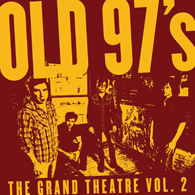
OLD 97’S
The Grand Theatre Vol. 2
Buy Now |
Well, I’m still of the opinion that the whole thing should have been released together as a proper double album in the first place, but that’s a moot point now. Nine months after releasing The Grand Theatre Vol. 2, the Old 97’s have made good on their promise to chase it with Volume Two in a timely manner, and fans are now free to play both volumes back to back, shuffle all 25 tracks together in their own iTunes playlist or maybe even cross their fingers for a truly grand, gatefold double-vinyl edition down the line. But there’s still one nit left to pick: The Grand Theatre Vol. 2 is far too good an Old 97’s record in its own right to be shortchanged with a sequel tag.
Granted, last year’s model was no half-assed effort, either, though the best songs on it were arguably the two spotlight-stealing vocal turns by bassist Murry Hammond (“You Were Born to Be In Battle” and “You Smoke Too Much”), and “Champaign, Illinois,” a quick melodic stroll down Bob Dylan’s epic “Desolation Row” with new lyrics (albeit with Dylan still given a proper co-writing credit.) On Vol. 2, lead singer and songwriter Rhett Miller is very much back on his A-game, effortlessly reeling off some of his best lines at least since his splendid 2002 major-label solo debut, The Instigator, if not going all the way back to such early 97’s gems as “Barrier Reef” and “Murder (Or a Heart Attack).” He hits an early peak here three songs in with the opening lines of “Perfume” (“When you explode into the room/all I can smell is your perfume/and the cigarette jazzing up the atmosphere”), then tops it in quick succession with the crackling good character study of “The Actor” (also a rocking showcase for guitarist Ken Bethea and drummer Philip Peeples) and the crunchy swagger of “No Simple Machine.” The comparatively mellower, reflective “Manhattan (I’m Done)” is another highlight. Meanwhile, Hammond’s first turn at the mic this time around, a sing-along pirate shanty called “White Port,” is an unabashed goof-off, but his second, “How Lovely It Was,” is a beauty on the level of his Volume One songs and his even finer contributions to 2008’s Blame It On Gravity, “This Beautiful Thing” and “Color of a Lonely Heart Is Blue.”
While the songwriting overall is of a higher grade than the offerings on The Grand Theatre Volume One, Vol. 2 adheres to its predecessor’s basic musical template: a hint of British garage rock here and there, but by and large a throwback to the Old 97’s vintage (as in mid-’90s) alt-country roots. The best hooks here aren’t as dizzyingly insistent as the ones double-stuffed into their 2001 power-pop opus Satellite Rides, but they gallop along with the straight-ahead wallop of 95’s Wreck Your Life and 97’s Too Far to Care, and that alone should be more than enough to satisfy the lion’s share of the long-running Dallas band’s fanbase. Whether taken as a whole or in bite-sized halves, The Grand Theatre may not be the boldest artistic statement and leap forward of the Old 97’s career, but all and all, it’s not a bad haul for a couple years’ work.
— RICHARD SKANSE
|
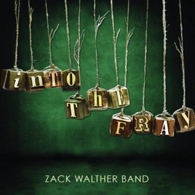
ZACK WALTHER BAND
Into the Fray
Buy Now
|
As a faithful follower of Zack Walther’s career dating back to his Rodger Wilco days, I’m tempted to call his latest release, Into the Fray, the best album of his career. But that wouldn’t be entirely fair to his previous output. You see, Zack is the type of artist that is constantly improving, always striving to get better at his craft. With each new album of his, up to and including this one, you hear an artist that is maturing and growing with each release. Into the Fray is a snapshot into his life right now. With a wife and new baby girl, he’s opening his soul and letting the world take a peak. These songs were road tested with his band for months before they made it to the studio, so they easily capture the spontaneous spirit of their live shows. They follow him effortlessly through a gamut of subject matters: the sleazy ex-manager (“Using My Words”); missing that special someone (“The Longest Night”); we’re all here, let’s party (“Tonight”); let me share the load (“Ease Your Mind”); and a father’s love for his new daughter (“Best Part of Me”). Walther is just one hit away from the brass ring and several songs from this album fall into that category, so hopefully the right people will hear this CD. You might just be that person. — DALE MARTIN |
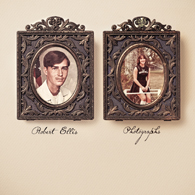
ROBERT ELLIS
Photographs
Buy Now
|
Not quite a cradle-to-the-grave narrative, Robert Ellis’ second album (and first with New West) nevertheless charts a lengthy portion in the arc of a life — for our purposes we’ll call the main character “He” — and the relationships that define it. It’s an assured and expansive album of impressionistic folk and dancehall country by the young Lake Jackson native who has cultivated a sizable following in Houston for his hard-driving Whiskey Wednesday performances as Robert Ellis and the Boys as well as his more contemplative solo acoustic performances.
“Friends Like Those” opens the album with gently picked acoustic guitar and a statement of purpose: “The things you leave behind will often cross your mind but you won’t forget them,” Ellis whispers. “Bamboo” finds our character emulating his father only to drift onto his own path. “Two Cans of Paint” playfully suggests new beginnings (“I could see myself getting old with you”), while “Westbound Train” puts all of us at the depot, where we try to catch a ride with another, all at the bidding of some mysterious “great rearranger” (who lent his name to Ellis’ debut album two years ago.)
That whole first half of the album is calm, a searching tone for a searching period of life. “Westbound Train” is the transition point where the feathery folk gives way to harder country. The second half brings love and conflict, opening with the yearning of the self-explanatory “Comin’ Home,” which later finds trouble when He and She find their migratory patterns between the bars and home don’t entirely match. There follows commitment and distrust and the blunt admission that He and She ain’t who they used to be. “We’ve both grown up quite a bit,” He admits.
On the title track, the photographs are meant to be taken down, not so much for a fresh start but as suppression of anguish. Nearly all 10 songs here have little snapshot details that give them a strong sense of place and time. But the photographs of Photographs aren’t a vessel for nostalgia. It’s an album that cycles through tough love and tough loss. As Ellis sings on “Bamboo,” “There ain’t one good thing about being on the bad end of a deal, like getting memories in place of something that was real.”
— ANDREW DANSBY
|
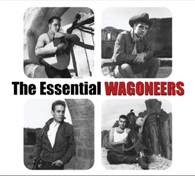
THE WAGONEERS
The Essential Wagoneers
Buy Now
|
Essentially some Houston teenagers transplanted to Austin, for a brief span of three years and two albums the Wagoneers coupled Ricky Nelson’s cool vocal style with Buck Owens twang to create something that would, with the passage of a decade, be deemed a forerunner of alternative country. The Essential Wagoneers is a single-disc reissue of the recently reunited band’s two long-out-of-print albums, Stout & High (1988) and Good Fortune (1989), and the songs stand up well. Recorded in Nashville with stalwart producer Emory Gordy, Jr., both albums had a throwback sound that mixed honky-tonk with faint tinges of rockabilly romp and punk attitude. Primary songwriter Monte Warden had classic-country songwriting skills beyond his years, but it’s the rougher, edgier tracks like “She Wouldn’t Have It,” “Hell Town,” and “I Can’t Stay” with legendary Sleepy LaBeef on guitar that truly marked the Wagoneers as something special in their day. This set also contains three bonus tracks, gospel recordings that were never released. For fans of Texas music in all its varieties, The Essential Wagoneers is a must.
— WILLIAM MICHAEL SMITH
|
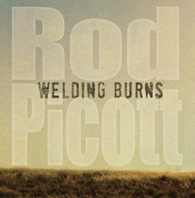
ROD PICOTT
Welding Burns
Buy Now
|
In the simple but highly effective video for his song “Little Scar,” Rod Picott — accompanied only by his acoustic guitar and the mournful cry of a pedal steel — serenades the memory of a lost love, portrayed in transparent, fleeting glimpses by his frequent musical partner, Amanda Shires. It’s over in well under three minutes, but like the ghost in the video, that haunting spell of lonesome lingers with you — just as it does with all 10 of the dusky, perfect beauties collected on Welding Burns. Picott lives in Nashville but hails from Maine, which explains both the blue-collar grit of songs like the title track and “Sheetrock Hanger” and his long association with fellow Maine native Slaid Cleaves, with whom Picott co-wrote three of the album’s tracks. (Picott, in turn, has had a hand in writing or co-writing a handful of the Austin-based Cleaves’ best-known songs, including “Broke Down.”) But it’s not really Picott’s rugged Northeastern roots or troubadour connections that make Welding Burns such a compelling listen; it’s the slow-burn ember of his raspy voice and the mature, broken-in emotional wisdom and resignation of his lyrics. Every observation here rings real and true, whether he’s reflecting on his own regrets and misgivings (“Hang my head down, drag the whole damn world around,” he laments on “Jealous Heart,” “I keep your picture in a box with this jealous heart of mine”), or sketching equally poignant portraits of down-and-out factory workers (“Rust Belt Field,” “410”). Sometimes, he inhabits the soul of those workers so completely that the line between narrator and subject is too blurred to distinguish one from the other. “I swore I wasn’t gonna stay here,” Picott sings in the weary voice of the title track’s second-generation shipyard worker, whose dresser drawer is filled with pocket T’s with “little holes burned in each one/Where the good shirts used to be.” “I used to dream a lot,” he sighs, “now I can’t remember what it was that I was dreaming of.” The scars Picott writes and sings about may vary in size, and not all of them are worn on the flesh, but they all ache like old war wounds.
— RICHARD SKANSE
|
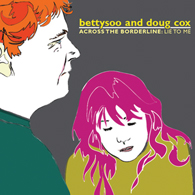
BETTYSOO AND DOUG COX
Across the Borderline: Lie to Me
Buy Now |
Spring, Texas, native BettySoo is one of the finest young folk singer-songwriters to emerge out of the Austin scene in the last decade. Her Gurf Morlix-produced third album, 2009’s Heat Sin Water Skin, was her breakout, but her 2007 sophomore set Little Tiny Secrets was an under-the-radar gem. Her original songs are top-notch, but it’s her singing that’s showcased on Lie to Me, BettySoo’s first collaboration with Vancouver Island dobro player Doug Cox under the duo name Across the Borderline. All 10 tracks here are covers, mostly by Texas writers (Butch Hancock, Guy Clark, Doug Sahm, Betty Elders, Blaze Foley, Jeff Talmadge and David Halley) but with Cox’s own homeland represented via songs by Loudon Wainwright III, Jane Sieberry and Bob Carpenter. Cox takes the lead vocal on Wainwright’s “Be Careful There’s a Baby in the House” and provides impeccable instrumental backing throughout, but it’s the across-the-board high quality of the material and BettySoo’s gorgeously expressive, crystal-clear voice that commands the most attention. Her take on “Dublin Blues” proves she could have certainly held her own amongst the Americana heavyweights represented on this fall’s forthcoming This One’s For Him: A Tribute to Guy Clark, and the lonesome, spooky reading she and Cox give Hancock’s “Boxcars” — though miles removed from the definitive, train-off-the-rails version laid down by the Joe Ely Band back in the ’70s — is disarmingly effective. Elders’ plaintive “Light in Your Window,” Carpenter’s “Every Other Road” and Talmadge’s “Lie to Me” are other highlights, but the rarest jewel here is “Louis Riel,” a lesser-known Doug Sahm song paying tribute to a Canadian folk hero of the same name. As it turns out, BettySoo isn’t the first talented Texas artist that Cox has known and worked with; Sahm wrote the song while living on Vancouver Island for a couple of years himself back in the ’80s.
— RICHARD SKANSE
|

THE KRAYOLAS
Tipsy Topsy Turvy
Buy Now |
If albums had thesis statements, “I ain’t no Cantinflas, baby, I ain’t no matador/I’m a genuine Mexified San Antonio rock and roll star” would say it all about the Krayolas’ fourth album since reforming in 2008. Hector Saldana and his mates know as much about San Antonio, its special brand of rock ’n’ roll and its history as Doug and Augie. From Saldana’s Peter-Case/Plimsouls hep-cat vocal snarl to Van Baines’ head-tangling guitar solos, Tipsy Topsy Turvy is exactly what one would expect from a band once billed as the Tex-Mex Beatles: a West Side heat-seeking missile. Highlights include bilingual rocker “1070 (I’m Your Dirty Mexican),” which sounds like a Pied Piper call to La Raza; “The Working People,” a brilliant, populist blue-collar soul tune right for our time; and the twanging homage, “Gordon Lightfoot.” And just to double the fun, the band burns through a happy-go-lucky take of Chuck Berry’s Christmas goofer, “Run Run Rudolph,” like they own it. San Antonio rock and roll is indeed alive and well.
— WILLIAM MICHAEL SMITH
|
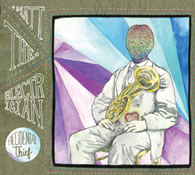
MATT THE ELECTRICIAN
Accidental Thief
Buy Now |
For dedicated fans of songwriter’s songwriter Paul Simon, Christmas came early this year with the release of the man’s best record since Graceland, the absolutely splendid So Beautiful, So What. But guess what? This little gem by Austin’s Matt Sever, aka Matt the Electrician, comes awfully close to topping it. Maybe the Simon comparison may seem a bit disingenuous, given that Sever’s singular charm is not sounding quite like anyone else; but there’s an undeniable element of almost casual eclecticism shared between the two artists — a disarming gift for marrying indelibly hummable, winsome melodies to adventurous musical arrangements that are anything but humdrum, and all without ever losing sight of the poetry of the song. Accidental Thief is Sever’s seventh studio album since his 1998 debut as Matt the Electrician, and anyone who’s already hip to his quirky trip will warm to the familiar baroque mix of banjos, Glockenspiels, trumpets, toy pianos, Wurlitzers, whistles and Severs’ toasty singing voice straight away. But after three or four listens, the record reveals a sense of ambition several steps up from anything he’s done in the past, employing a full but tasteful production that swells at points (“Pioneer Bride”) to Mumford & Sons-level grandeur while still retaining the intimate mystique of his acoustic solo performances. Meanwhile, all 12 songs here — several of which were born out of Severs’ participation in the ongoing House of Songs project, which pairs Austin artists with songwriters from other cities around the world — rank both lyrically and melodically amongst the best he’s ever written. The elegantly lovely “I Will Do the Breathing” and the spooky, playful “Ghost Story” stand out as especially fine, but isolating “highlights” on a record this steeped in beauty and whimsical wonder is, of course, purely arbitrary.
— RICHARD SKANSE
|
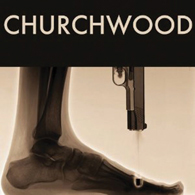
CHURCHWOOD
Churchwood
Buy Now |
Dense and nasty, literate and mean, Austin’s Churchwood sounds like Captain Beefheart trying to cut Tom Waits’ throat with a rusty harmonica. From the opening crash-and-clash of the Beefheartian “Pontiac Flanagan,” twin guitars mesh and work off each other like long-time lovers pushing all the right buttons. Dangerous, foreboding, in-your-face tracks like “Vendidi Fumar (I Smell Smoke),” “Melungeon in the Dungeon,” and “Supermonisticgnostiphistic” put an evil new twist on blues-rock that takes the music far beyond the too-common Stevie Ray mega-solo blues-jam template. Theatrical and sociopathic, Churchwood swaggers mightily on punch-you-in-face tracks like “Pity the Noose” (“if you see me hangin’ don’t you cut me loose/just pity the noose”). Lyrically there isn’t a weak or clichéd moment in this amazing set of music that sounds like the future meeting the past, especially when these Austin veterans riff off Tom Waits on “Abraxas” and boogie through a stinging French-language interpretation of Bo Diddley’s eponymous signature (renamed “Rimbaud Diddley”). This is a powerful, unique rock record that stings the mind and prods the soul.
— WILLIAM MICHAEL SMITH
|
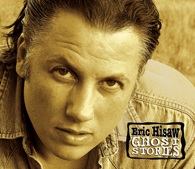
ERIC HISAW
Ghost Stories
Buy Now |
Austin’s Eric Hisaw (originally from Las Cruces, N.M.) has knocked out a handful of solid roots-rock releases over the last decade, including 2008’s Nature of the Blues, 2006’s The Crosses, 2002’s Never Could Walk the Line and his exceptional 2000 debut, Thing About Trains. But with the 10 just-about-perfect tales of hard-traveled and weary-hearted workingman blues collected on Ghost Stories, the journeyman songwriter, guitarist and singer delivers his first stone-cold masterpiece. Hisaw’s an old-school, record-collecting music hound; he’s contributed “Mr. Record Man” career overviews on Waylon Jennings, Doug Sahm, Joe Ely and Billy Joe Shaver to this magazine, and his songwriting and guitar chops further reflect his lifelong obsession with gritty outlaw troubadours, honky-tonk heroes and Gram Parsons-obsessed Rolling Stones. But he also draws inspiration from two decades of firsthand experience slugging out a living with blue-collar jobs by day and bar-band gigs at night, which accounts for the lived-in nature of his blues that lends his songs the satisfying heft of real-deal integrity. Hisaw produced the album himself, supplementing his husky vocals and tasteful, J.J. Cale-meets-Keith Richards leads with sterling assists form bassist/B3 player Ron Flynt, drummer Vicente Rodriguez, harmony and background singer Chrissy Flatt and special guest Lloyd Maines on pedal steel and dobro. Every damn song here rings tried and true and cuts right to the bone and heart, from the bittersweet, sweat-stained memories of the title track, “Johnston County” and “Don’t Live There” to the road-beaten sigh of “Pay Phone” and the knock-you-off-your-barstool gut-punch of “Love She Wants.” There’s nothing supernatural here, but if lines like “He’ll hold her up when she can barely make the door/knowing he’s not the one she’s reaching for” don’t make the hair on the back of your neck stand straight up and shiver, odds are you’re already dead.
— RICHARD SKANSE
|
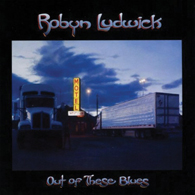
ROBYN LUDWICK
Out of These Blues
Buy Now
|
Yes, Robyn Ludwick has famous Americana-ish brothers and/or sisters-in-law (Is a sister-in-law who’s an ex to a brother still a sister to a gal? I’m guessing so). In any event, it’s time to stop holding those familial facts against her. Because with Out of These Blues, her third release since 2005, Ludwick finally steps out of the huge shadows the Robison boys from Bandera cast and proves she’s the realest of deals. In fact, she may well be the best songwriter of the clan. These aren’t beer-guzzling, frat-boy slur-along-songs or sappy love ballads to the perfect mate; these are songs of the hard truths of messy lives and the endless Hobson’s choices the lovelorn and unlucky confront. It’s there in the echos of a quick slam-bam, thank you, ma’am one-night-stand in a truck stop-motel room on the title track (“Love won’t come and love don’t wait/but what makes me crazy are those out-of-state plates/see I never knew when to hold on, but I sure know when to let go/baby that’s just the way that I roll.”) Then, on “Steady,” with its “Don’t Let Me Down” Billy Preston vibe, she tells another lover, “Don’t tell me you’ll wait, cuz I won’t need you tomorrow/Please tell me you’ll stay here all night.”) And on “Fight Song,” she tauts the man who’s doing her wrong with “I’ll take it off, baby, let it fall to the floor, and you can love me all night through that crack in the door.” One can imagine Gurf Morlix licking his producer chops upon first hearing these songs, and he’s given them his magic touch with assists from Ian MacLagan, Trish Murphy and Slaid Cleaves. But it’s Ludwick’s unvarnished voice that is the instrumental tool Morlix seems to use most effectively, and together, the two find unique ways on every track to bring out these raw, honest and blue songs their soul and essence.
— GLEASON BOOTH
|
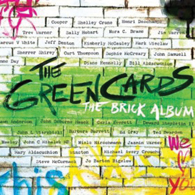
THE GREENCARDS
The Brick Album
Buy Now
|
After three releases on Dualtone Records and one on Sugar Hill, the Australia-to-Austin-to-Nashville migrants the Greencards funded their new indie album with a novel idea: They sold the artistic equivalent of building or sidewalk bricks, giving every buyer a named “brick” in the album art. We don’t know if it funded performances by mandolin guru Sam Bush or vocalist/guitarist Vince Gill, but both contribute. Bush is on the Fleetwood Mac-ish opener, “Make It Out West”; Gill joins vocalist/bassist Carol Young on “Heart Fixer.” Producer Justin Niebank upholds the band’s usual standard of sterling sound, and helps them continue exploring areas ranging far beyond bluegrass (though there’s more of a pop vibe and less of the jazz inflections that made Veridian such a special release). Young’s crystalline voice is especially pleasing on “Naked on the River” and the delicate “Girl in the Telescope” (another tune on which Young and band co-founder Kym Warner collaborated with fellow Aussie-to-Nashville transplant Jedd Hughes). Yet the ultimate standouts are Warner’s mandolin-driven instrumentals, “Adelaide” and “Tale of Kangario” (wonderfully augmented by new addition Tyler Andal on fiddle). You can take the player out of Australia ... .
— LYNNE MARGOLIS
|
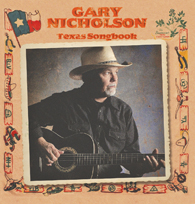
GARY NICHOLSON
Texas Songbook
Buy Now
|
Gary Nicholson’s long career has yielded many hits and high points, including producing two Grammy-winning albums for fellow Fort Worth expat and longtime pal Delbert McClinton. He also had a stake in the Grammy-winning Crazy Heart soundtrack, co-writing “Fallin’ and Flyin’” with another Fort Worth native and friend, the late Stephen Bruton. Though Nicholson’s lived in Nashville for ages, his Texas roots run deep and proud, as evidenced by the 13 Texas-centric tracks contained on this Lone Star love letter. Most of these songs have been done in more wow-worthy versions by other artists, but it’s always nice to hear a tune done by the writer(s) responsible for its existence. Standouts include the opener, “Texas Weather,” and the closer, “Somedays You Write the Song,” his Grammy-nominated collaboration with Guy Clark and Jon Randall Stewart. “Listen to Willie” revels in its contrivance (song titles worked into lyrics), but redeems itself with Ray Benson’s delivery of the line, “While the oil spills in the sea, he’s runnin’ on French fry grease.” The McCrary sisters give a great harmony boost to “Bless ’Em All”; Stewart, Joe Ely, Marcia Ball, Randy Rogers, Joel Guzman, Stoney LaRue and Mickey Raphael show up elsewhere, along with Benson, Jason Roberts and other members of Asleep at the Wheel. There’s even a Bob Wills rave-up (“She Feels Like Texas”). You can’t get more Texan than that.
— LYNNE MARGOLIS |
|


